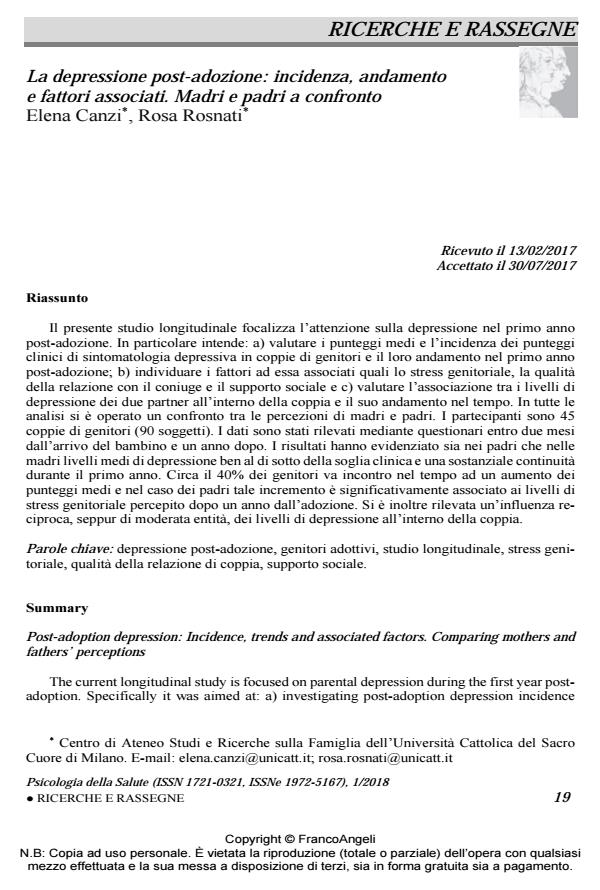La depressione post-adozione: incidenza, andamento e fattori associati. Madri e padri a confronto
Titolo Rivista PSICOLOGIA DELLA SALUTE
Autori/Curatori Elena Canzi, Rosa Rosnati
Anno di pubblicazione 2018 Fascicolo 2018/1
Lingua Italiano Numero pagine 19 P. 19-37 Dimensione file 231 KB
DOI 10.3280/PDS2018-001002
Il DOI è il codice a barre della proprietà intellettuale: per saperne di più
clicca qui
Qui sotto puoi vedere in anteprima la prima pagina di questo articolo.
Se questo articolo ti interessa, lo puoi acquistare (e scaricare in formato pdf) seguendo le facili indicazioni per acquistare il download credit. Acquista Download Credits per scaricare questo Articolo in formato PDF

FrancoAngeli è membro della Publishers International Linking Association, Inc (PILA), associazione indipendente e non profit per facilitare (attraverso i servizi tecnologici implementati da CrossRef.org) l’accesso degli studiosi ai contenuti digitali nelle pubblicazioni professionali e scientifiche.
Il presente studio longitudinale focalizza l’attenzione sulla depressione nel primo anno post-adozione. In particolare intende: a) valutare i punteggi medi e l’incidenza dei punteggi clinici di sintomatologia depressiva in coppie di genitori e il loro andamento nel primo anno post-adozione; b) individuare i fattori ad essa associati quali lo stress genitoriale, la qualità della relazione con il coniuge e il supporto sociale e c) valutare l’associazione tra i livelli di depressione dei due partner all’interno della coppia e il suo andamento nel tempo. In tutte le analisi si è operato un confronto tra le percezioni di madri e padri. I partecipanti sono 45 coppie di genitori (90 soggetti). I dati sono stati rilevati mediante questionari entro due mesi dall’arrivo del bambino e un anno dopo. I risultati hanno evidenziato sia nei padri che nelle madri livelli medi di depressione ben al di sotto della soglia clinica e una sostanziale continuità durante il primo anno. Circa il 40% dei genitori va incontro nel tempo ad un aumento dei punteggi medi e nel caso dei padri tale incremento è significativamente associato ai livelli di stress genitoriale percepito dopo un anno dall’adozione. Si è inoltre rilevata un’influenza reciproca, seppur di moderata entità, dei livelli di depressione all’interno della coppia.
Parole chiave:Depressione post-adozione, genitori adottivi, studio longitudinale, stress genitoriale, qualità della relazione di coppia, supporto sociale.
- ‘Writing about our adoption’: A qualitative study on intercountry adoptive parents’ narratives during the first post-adoption year Elena Canzi, Sara Molgora, Laura Ferrari, Sonia Ranieri, Lavinia Mescieri, Rosa Rosnati, in Adoption & Fostering /2021 pp.122
DOI: 10.1177/03085759211003171
Elena Canzi, Rosa Rosnati, La depressione post-adozione: incidenza, andamento e fattori associati. Madri e padri a confronto in "PSICOLOGIA DELLA SALUTE" 1/2018, pp 19-37, DOI: 10.3280/PDS2018-001002